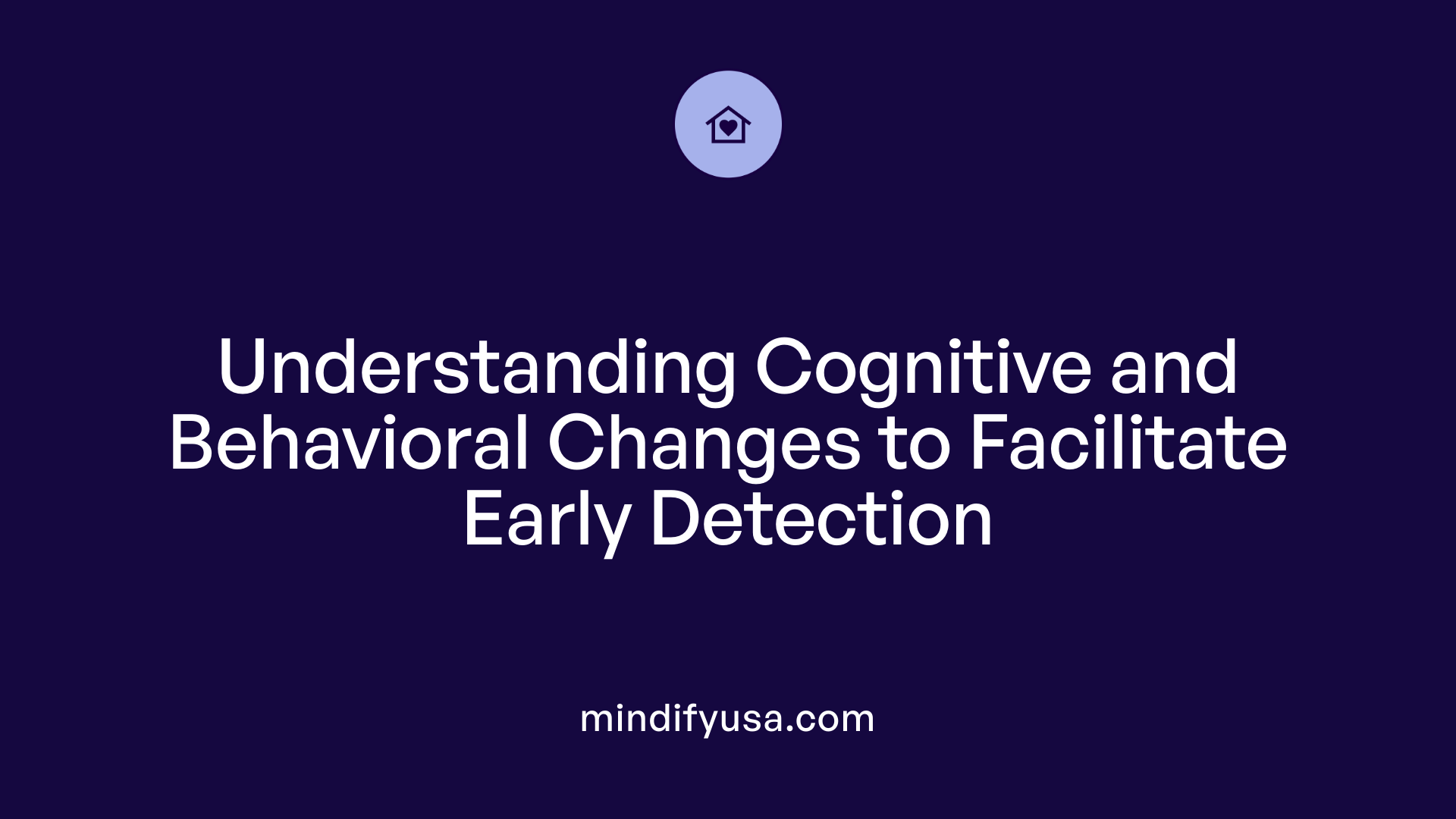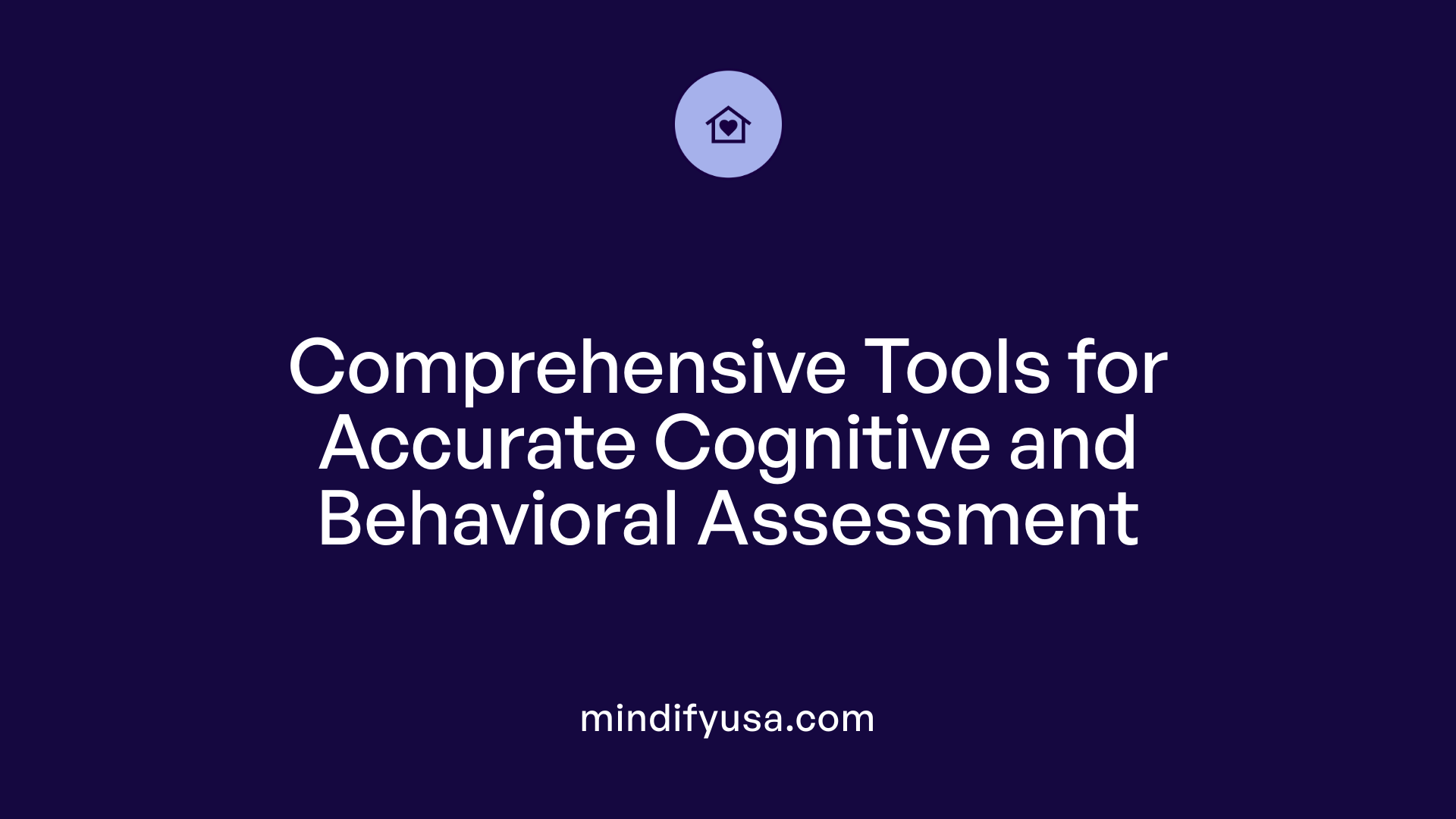A comprehensive overview of psychological assessments in dementia
Psychological assessments are critical tools in the detection, diagnosis, and management of dementia. They provide nuanced insights into cognitive, behavioral, and psychological changes, facilitating early intervention, precise diagnosis, and tailored treatment planning. This article explores the purpose, tools, methods, guidelines, recent advances, and clinical applications of psychological assessments for dementia, emphasizing their vital role in improving patient outcomes and advancing research in this vital field.
Purpose of Psychological Assessments in Dementia
 The primary goal of psychological assessments in dementia is to establish an accurate diagnosis by detecting cognitive impairments and distinguishing dementia from other potential causes such as depression or medical conditions. These evaluations involve a series of standardized tests across multiple cognitive domains, including attention, memory, language, visuospatial skills, and executive functions. By comparing individual scores with normative data, clinicians can determine the severity and specific features of the impairment.
The primary goal of psychological assessments in dementia is to establish an accurate diagnosis by detecting cognitive impairments and distinguishing dementia from other potential causes such as depression or medical conditions. These evaluations involve a series of standardized tests across multiple cognitive domains, including attention, memory, language, visuospatial skills, and executive functions. By comparing individual scores with normative data, clinicians can determine the severity and specific features of the impairment.
Differentiating between types of dementia—such as Alzheimer’s disease, vascular dementia, or primary progressive aphasia—is another crucial purpose. Neuropsychological profiles help identify characteristic patterns of neural regional involvement, supporting a precise diagnosis.
Furthermore, these assessments serve as a baseline to monitor disease progression and functional decline over time. The information gleaned from testing guides care planning and education by informing patients and caregivers about prognosis and management strategies. Although they do not pinpoint the exact disease etiology alone, neuropsychological evaluations often work in concert with biomarker and imaging studies to support a comprehensive understanding of the patient's condition.
Overall, psychological assessments are invaluable tools that facilitate early detection, guide clinical decision-making, and enhance the quality of life for individuals living with dementia.
Tools and Tests Used in Dementia Evaluation

What tools and tests are commonly used in psychological assessments for dementia?
Assessment of dementia involves a variety of tools designed to detect cognitive decline, differentiate between different types of dementia, and monitor changes over time. In primary care settings, brief screening instruments are often used for quick evaluation. The Mini-Cog, General Practitioner Assessment of Cognition (GPCOG), and Memory Impairment Screen are favored for their efficiency and ease of administration.
For more detailed evaluation, neuropsychological tests are employed to assess specific cognitive domains. These include the Mini-Mental State Examination (MMSE) and the Montreal Cognitive Assessment (MoCA), both of which are standardized tools that evaluate memory, attention, language, visuospatial skills, and executive functions. The SLUMS exam is another example that provides a comprehensive cognitive profile.
Behavioral assessments often involve structured interviews with informants, such as the Alzheimer's Disease-8 (AD8) or the Informant Questionnaire on Cognitive Decline in the Elderly (IQCODE). These tools help gather information about changes in cognition and daily functioning from family members or caregivers.
Additional assessments tailored for cultural and linguistic considerations include the Rowland Universal Dementia Assessment Scale (RUDAS) and the Kimberley Indigenous Cognitive Assessment (KICA). These instruments help ensure accurate diagnosis across diverse populations.
Laboratory tests, including blood work, and neuroimaging techniques like CT or MRI scans, are crucial in ruling out other causes of cognitive impairment and identifying structural brain changes associated with different dementia types.
| Assessment Tool | Main Focus | Suitable Settings | Comments |
|---|---|---|---|
| Mini-Cog, GPCOG, Memory Screen | Quick cognitive screening | Primary care, community screening | Short, easy to use, high sensitivity for screening |
| MMSE, MoCA, SLUMS | Detailed cognitive evaluation | Neurology clinics, research | Standardized, cover multiple domains |
| AD8, IQCODE | Informant-based reports on cognitive change | Clinical, research, community | Useful for capturing observable changes over time |
| RUDAS, KICA | Culturally sensitive assessments | Diverse populations | Designed to minimize bias from language or culture |
| Laboratory & Imaging | Biological and structural diagnosis | Hospitals, specialty clinics | Critical for comprehensive evaluation and diagnosis |
Effective dementia assessment relies on combining these tools to formulate a thorough understanding of the patient's cognitive status, guiding diagnosis and management.
Role of Psychological Assessments in Diagnosing Dementia
How do psychological assessments help in diagnosing dementia?
Psychological assessments are vital in the process of diagnosing dementia because they offer a comprehensive evaluation of a patient’s cognitive abilities and behavioral changes. These assessments involve standardized tests that measure various cognitive functions including attention, language, visuospatial perception, episodic memory, and executive functions.
By comparing test scores to normative data, clinicians can detect even subtle impairments that might not be obvious in everyday functioning. This early detection is critical for diagnosing dementia at its initial stages, before significant cognitive decline occurs.
Assessments assist in determining the severity and particular pattern of deficits, which can point to specific dementia syndromes. For example, prominent memory problems may suggest Alzheimer’s disease, while language deficits could indicate primary progressive aphasia.
Furthermore, psychological testing contributes to the differential diagnosis, helping distinguish dementia from other neurological or psychiatric conditions. The information gleaned can also predict disease progression and guide treatment planning.
Discussing results with patients and their families helps in understanding the diagnosis, prognosis, and necessary care steps. In summary, neuropsychological evaluations provide essential insights that support diagnosis, prognosis, and tailored management strategies.
How do assessments evaluate the pattern of affected cognitive domains?
The evaluation pinpoints which cognitive areas are most compromised. For instance, early amnesia points to hippocampal involvement, while visuospatial deficits indicate parietal lobe issues.
Can assessments distinguish different dementia types?
Yes, the cognitive profiles obtained help differentiate conditions like Alzheimer’s disease, frontotemporal dementia, and Lewy body dementia, based on the affected domains and their severity.
How does early detection influence disease management?
Detecting dementia early allows for timely intervention, planning, and support. It also offers an opportunity for patients to participate in research and access treatments that may slow progression.
| Aspect | Description | Impact |
|---|---|---|
| Cognitive Domains | Attention, memory, language, visuospatial, executive | Helps identify deficits and affected brain regions |
| Disease Differentiation | Alzheimer’s, frontotemporal, vascular, etc. | Guides specific treatment approaches |
| Disease Staging | Mild, moderate, severe | Assists in prognosis and care planning |
| Patient and Caregiver Support | Understanding diagnosis | Improves management and compliance |
Ongoing developments
Advances in digital assessments and biomarkers complement traditional neuropsychological tests by providing quicker, less invasive, and more accessible means for early detection.
Through these comprehensive assessments, clinicians can make more accurate diagnoses, stage the severity of dementia, and develop personalized treatment pathways.
Standards, Guidelines, and Best Practices

What are the best practices and guidelines for conducting psychological evaluations for dementia?
In clinical neuropsychology, conducting an effective dementia evaluation requires adherence to established standards that promote accuracy, ethics, and cultural sensitivity. The process begins with utilizing standardized, validated tools that provide reliable measurements across cognitive, behavioral, and psychological domains. Common cognitive assessments include brief screening instruments like the Mini-Cog, GPCOG, and RUDAS for initial detection, progressing to more comprehensive tests such as the Mini-Mental State Examination (MMSE) or Montreal Cognitive Assessment (MoCA) if initial screens indicate concern.
A thorough assessment integrates multiple information sources. Gathering collateral data from family members or caregivers offers context about changes in functioning, behavioral symptoms, and daily activities. This holistic approach ensures a nuanced understanding of the patient's condition.
Evaluation should also be aligned with current guidelines from authoritative bodies, including the American Psychological Association (APA) and other neuropsychological societies. These guidelines emphasize incorporating medical, psychiatric, and functional assessments, along with laboratory tests and neuroimaging—preferably MRI—to rule out other potential causes of cognitive decline.
Ethical considerations are paramount. Clinicians must obtain informed consent, maintain confidentiality, and communicate findings clearly and compassionately. Early diagnosis disclosure should be respectful and supportive, emphasizing understanding and forward planning.
Cultural sensitivity and adaptation are critical in assessment. Tests should be chosen and interpreted considering the patient’s language, cultural background, and educational level to avoid misdiagnosis. When necessary, culturally adapted versions of tests are employed, and clinicians should be aware of normative data relevant to diverse populations.
Recent advancements advocate the integration of biomarkers, such as cerebrospinal fluid analysis and advanced neuroimaging, with neuropsychological data to improve diagnostic certainty. This combination offers a probabilistic view of underlying pathology, particularly for disorders like Alzheimer’s disease and frontotemporal lobar degeneration.
Finally, ongoing monitoring and longitudinal assessment are recommended, as dementia symptoms evolve over time. Regular follow-up helps in tracking disease progression, modifying care plans, and supporting patients and their families effectively.
| Practice Element | Description | Additional Notes |
|---|---|---|
| Use of standardized tools | Reliable cognitive and behavioral assessments | MMSE, MoCA, GPCOG, neuropsychological tests |
| Ethical conduct | Informed consent, confidentiality, respectful disclosure | Essential for patient trust and compliance |
| Cultural adaptation | Tests and interpretation suited to cultural background | Use validated, culturally sensitive instruments |
| Guidelines adherence | Following recommendations from APA, neuropsychology societies | Ensures quality and consistency |
| Biomarker integration | Combining neuropsychological test results with biological data | Enhances diagnostic accuracy |
| Longitudinal follow-up | Regular reassessment to monitor progression | Supports ongoing care and planning |
By adhering to these practices, clinicians can optimize the accuracy of dementia diagnoses, provide ethical and culturally competent care, and facilitate better outcomes for patients and their families.
Recent Advances and Future Perspectives

What are the recent advances and future directions in dementia assessment methods?
The field of dementia assessment has experienced rapid growth with innovative tools that promise earlier and more accurate diagnosis. One notable development is the advent of digital cognitive assessments. These computerized tests, such as Creyos Health, allow for quick, non-invasive evaluation that can be administered remotely. This technology reduces patient stress, facilitates longitudinal tracking, and broadens accessibility, especially in underserved or remote areas.
Alongside digital assessments, advances in biomarkers and neuroimaging have significantly improved diagnostic specificity. Blood-based biomarkers like amyloid beta ratios, tau protein levels, and neurofilament light chain are increasingly being validated as early indicators of Alzheimer’s pathology. Neuroimaging techniques, such as PET scans detecting amyloid deposits and tau tangles, alongside MRI imaging revealing structural brain changes, enable clinicians to identify underlying disease processes even before clinical symptoms become evident.
Early detection techniques are also expanding into novel domains like retinal imaging and advanced PET scans, which can uncover signs of cognitive decline through less invasive means. These methods offer promising avenues for screening large populations efficiently.
Efforts are also underway to develop assessment tools that are culturally valid and adaptable to diverse populations worldwide. This is crucial because cognitive testing tools must consider linguistic, educational, and cultural differences to ensure accuracy. Researchers are working on creating brief, multi-domain assessments that are easy to administer by non-specialists, thereby expanding the reach of cognitive screening in primary care settings.
The integration of digital technology with traditional assessment approaches marks a significant future direction. Such integration allows for continuous monitoring, data sharing, and real-time analysis. Moreover, combining biomarker data with cognitive testing results supports a more comprehensive, probabilistic diagnosis of underlying pathologies, including Alzheimer’s disease, frontotemporal lobar degeneration, and other neurodegenerative disorders.
Ongoing international studies focus on validating these emerging assessment methods across diverse populations, ensuring their efficacy and fairness. Research funded by organizations like NIH emphasizes understanding multimorbidity effects and tailoring personalized diagnostic pathways.
In summary, future advances in dementia assessment are orienting toward earlier detection, cultural sensitivity, technological integration, and personalized diagnostics. These developments aim to transform how clinicians identify and manage dementia, ultimately leading to timely interventions and improved quality of life for individuals worldwide.
Criteria for Selecting Appropriate Psychological Measures
What criteria should be considered when selecting psychological measures for dementia assessment?
Choosing the right psychological tests is crucial for effective dementia evaluation. Several factors influence the suitability of a measure for an individual patient or a clinical setting.
First, the psychometric properties of the test are fundamental. Validity ensures that the test accurately measures what it intends to, whether it's memory, language, or executive function. Reliability indicates consistency over time and across different situations. A test with strong validity and reliability provides trustworthy results that can inform diagnosis and care decisions.
Next, sensitivity and specificity are important. Sensitivity reflects the test's ability to correctly identify those with dementia, helping in early detection. Specificity relates to correctly ruling out those without the condition. High sensitivity and specificity minimize false positives and negatives, making the test more reliable.
Cultural and educational considerations also play a role. Tests should be appropriate for the individual’s background to avoid misinterpretation due to cultural biases or language barriers. For example, certain visual or language-based tasks may not be suitable across diverse populations.
Ease of administration and practicality are practical factors to weigh. Brief, straightforward assessments are often preferred in primary care or busy settings. They require less time, are less stressful for patients, and can be performed by a range of healthcare providers.
Alignment with the assessment purpose is critical. For screening, quick and broad measures like the MMSE or MoCA are common. For a comprehensive evaluation, more detailed neuropsychological batteries may be necessary. For tracking disease progression, measures that are sensitive to changes over time are essential.
Finally, the evidence base backing the test is vital. Psychometric data should be supported by peer-reviewed research. The test should have demonstrated appropriateness and accuracy in the intended population, considering factors like age, education, and comorbidities.
In summary, selecting appropriate psychological measures involves balancing scientific robustness with practical usability, cultural relevance, and alignment with the clinical question. Doing so ensures the assessment provides meaningful, accurate, and actionable information for managing dementia.
Application in Clinical Practice for Dementia Care

How are psychological assessments used in clinical practice for dementia care and management?
Psychological assessments are vital in managing dementia, offering insights into behavioral, psychological, and cognitive symptoms. These evaluations help clinicians understand the severity and nature of neuropsychiatric symptoms such as agitation, depression, anxiety, and wandering. By characterizing these symptoms, healthcare providers can tailor interventions that are more effective for individual patients.
Tools like the Neuropsychiatric Inventory (NPI) are widely used to measure the frequency and severity of behavioral symptoms. Brief screening instruments, such as the Geriatric Psychiatric Screening (GPS), assist in early detection and ongoing monitoring.
Neuropsychological testing further supports diagnosis by assessing different cognitive domains, including memory, language, visuospatial skills, and executive functions. These results help differentiate between various types of dementia, estimate disease stage, and predict progression.
Importantly, psychological assessments inform treatment planning. They guide non-pharmacologic strategies, like environmental modifications or structured activities, that can reduce behavioral challenges. Identifying triggers for symptoms also enables caregivers and clinicians to implement targeted interventions.
Regular re-evaluation is essential. Ongoing assessments monitor disease progression and treatment response, allowing adjustments to care plans over time. This continuous approach ensures interventions remain appropriate and effective, improving quality of life for both patients and caregivers.
Overall, comprehensive psychological assessment enhances clinical understanding, supports early diagnosis, and facilitates personalized care strategies that adapt to changing needs across the course of dementia.
Summarizing the Importance of Psychological Assessments in Dementia
Psychological assessments are indispensable in the comprehensive management of dementia. They facilitate early detection, aid in differential diagnosis, and support personalized treatment approaches. Advances in assessment tools, including digital innovations and biomarkers, promise to enhance accuracy and accessibility. Strict adherence to guidelines, cultural sensitivity, and individualized considerations ensure the clinical utility of these evaluations. As research continues to evolve, psychological assessments will remain at the forefront of improving diagnostic precision, guiding therapeutic decisions, and ultimately enhancing quality of life for individuals living with dementia and their families.
References
- Neuropsychological Assessment in Dementia Diagnosis
- Assessment and diagnosis of dementia
- Evaluation of Dementia and Age-Related Cognitive Change
- Assessing behavioral and psychological symptoms of ...
- Cognitive Assessment Considerations: Understanding the ...
- Person‐centered assessment of people living with dementia ...
- Cognitive Tests for Dementia: Diagnostic Tools For Primary ...





































































































